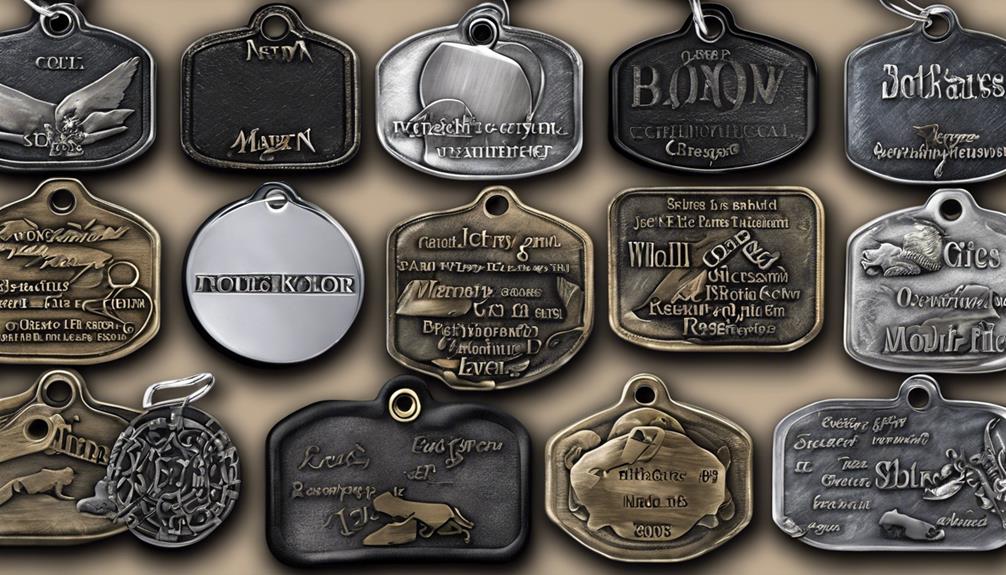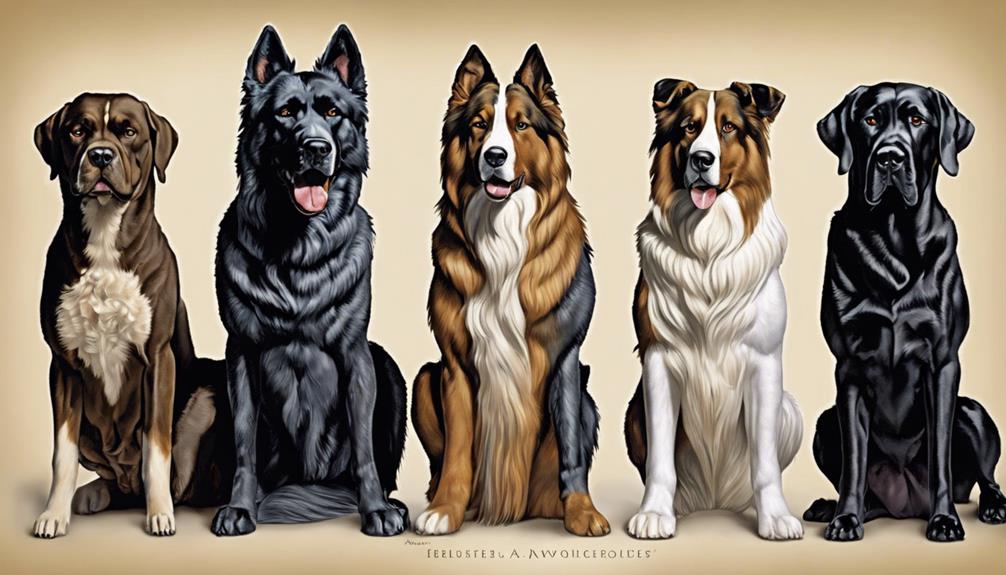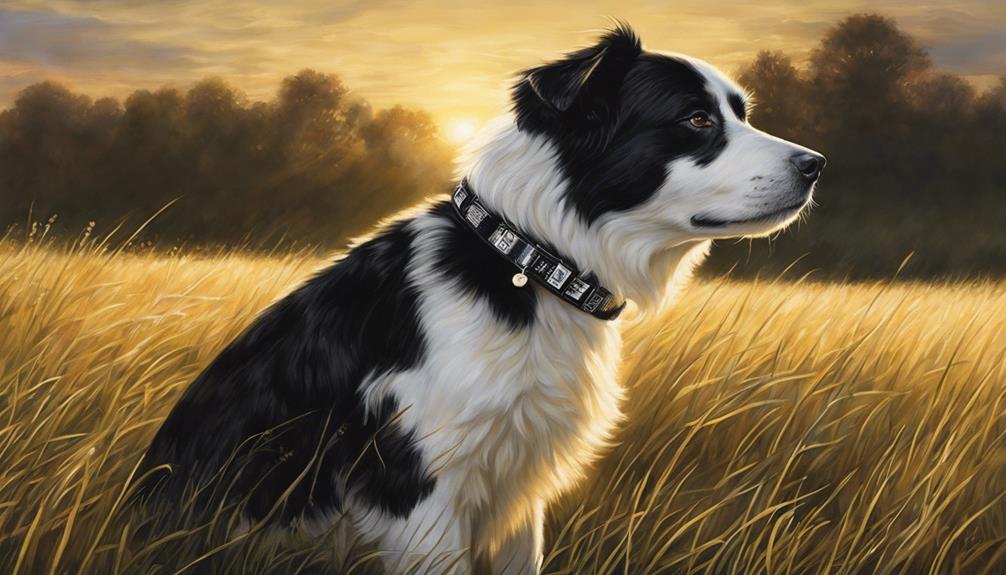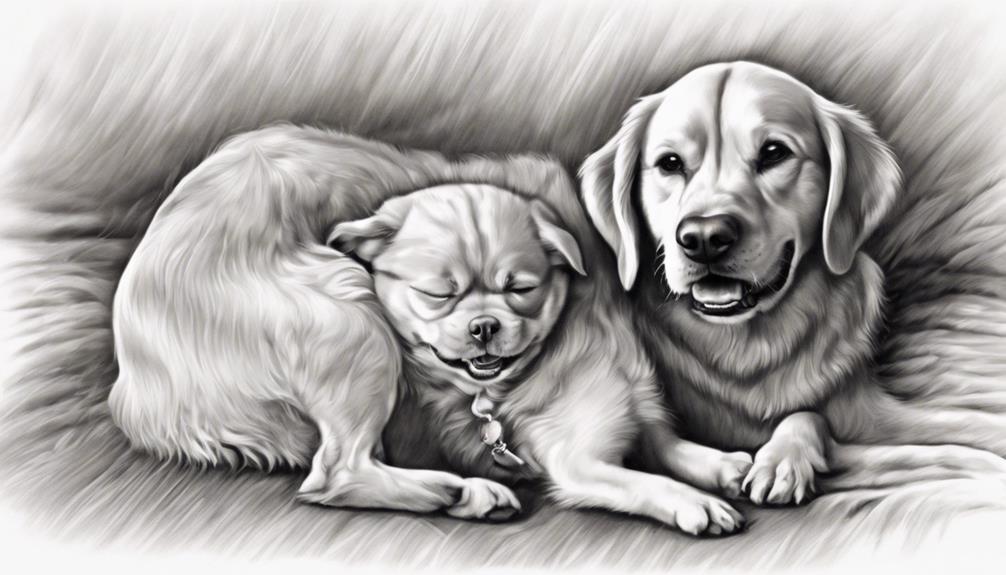When selecting black dog names, consider classics like Onyx or Midnight. Cute options include Oreo and Lily, reflecting their sweet nature. For a unique touch, try Chaplin or Nyx to explore creativity and humor. Popular names like Panda are always a hit. Delve into history for elegant choices like Duchess or Duke. If humor is your style, think about names like Liquorice. Sherlock fans might like Sirius Black. These names aren't just labels; they can establish a special bond with your furry friend. More name ideas await to assist you in finding the perfect fit for your new companion.
Key Takeaways
- Choose classic names like Onyx and Midnight for a strong and protective feel.
- Opt for cute names like Oreo and Lily for a sweet and charming touch.
- Consider unique names such as Chaplin and Cosmos for creativity and humor.
- Explore popular names like Oreo and Midnight for familiarity and appeal.
- Look into rare names inspired by mythology or literature for a distinctive choice.
Classic Black Dog Names
When selecting a name for your new black furry friend, consider opting for classic black dog names that exude timeless elegance and sophistication. Names like Onyx, Midnight, and Raven are popular choices that can give your pet a distinguished identity.
Onyx, a sleek black gemstone, symbolizes strength and protection, making it a fitting name for a loyal companion. Midnight evokes the mysterious allure of the night, perfect for a dog with a dark coat that shines under the moonlight. Raven, inspired by the intelligent and majestic black bird, adds a touch of sophistication to your pet's persona.
These classic black dog names not only sound elegant but also carry a sense of depth and character, reflecting the beauty of your black-coated canine companion. Embracing these timeless names can set your furry friend apart and showcase their unique charm and grace.
Cute Black Dog Names
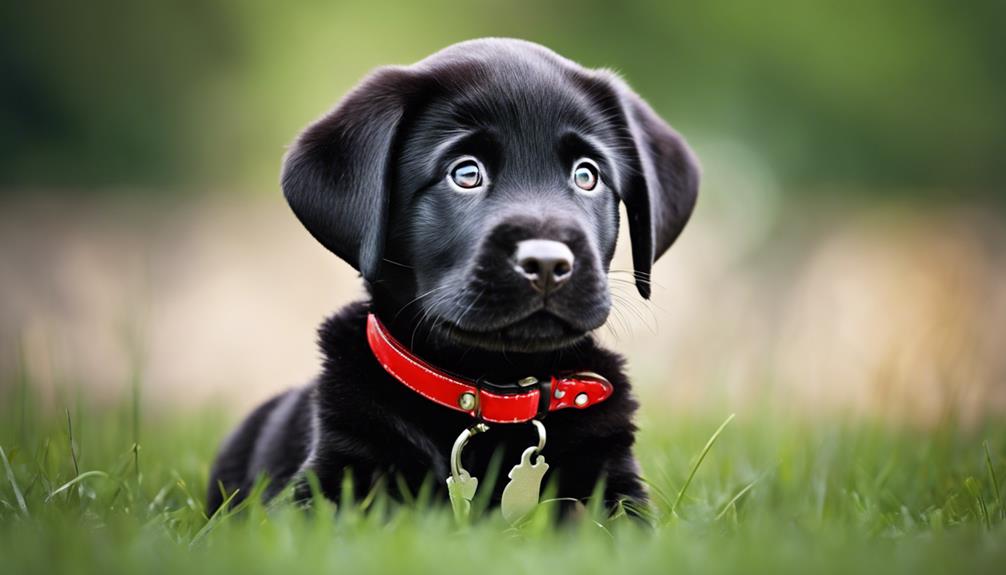
When selecting a cute black dog name, consider options that highlight the adorable side of your pet.
These names often showcase the sweet and charming nature that black dogs possess.
Some popular choices like Oreo, Lily, and Mickey can be unique and endearing for your furry companion.
Adorable Black Dog Names
Consider adopting a cute black dog name inspired by adorable animals or sweet treats to match your furry friend's playful personality. Here are some adorable black dog names to choose from:
- Poppy
- Panda
- Mickey
- Lily
- Oreo
These names can perfectly suit black dogs with lovable and affectionate traits. Opting for a cute name for your black dog not only reflects their endearing qualities but also brings joy to your daily interactions.
Adding a touch of charm and sweetness through these names can further enhance your furry friend's identity, making them even more special in your eyes. Choose a name that resonates with both you and your adorable black dog for a bond that's as strong as it's sweet.
Unique Choices for Black Dogs
For black dogs seeking a name that stands out, exploring unique options can add a touch of individuality to their identity. When choosing a black dog name, consider funny names like Chaplin or Cosmos to bring a sense of humor to your furry companion.
Unique choices such as Morticia or Nyx can set your dog apart from the rest, reflecting their special qualities. These names not only sound cool but also give your black dog a distinctive presence.
Embracing unconventional black dog names allows you to showcase your creativity and bond with your pet in a fun way. So, if you want your black dog to have a name that sparks interest and laughter, consider these unique and funny options to make your furry friend truly stand out.
Popular Black Dog Names
Let's explore some adorable and charming names that are popular choices for black dogs.
- Oreo
- Panda
- Midnight
- Lily
- Poppy
These cute black dog names are favored by many dog owners for their playful and sweet connotations. Choosing a popular black dog name like these can perfectly reflect the affectionate and lovable nature of your furry companion.
Whether you opt for a name like Oreo or Midnight, these names can make your new furry friend stand out and easily recognizable by others. The popularity of these cute black dog names highlights the endearing qualities that black dogs possess, making them even more irresistible and charming.
Unique Black Dog Names
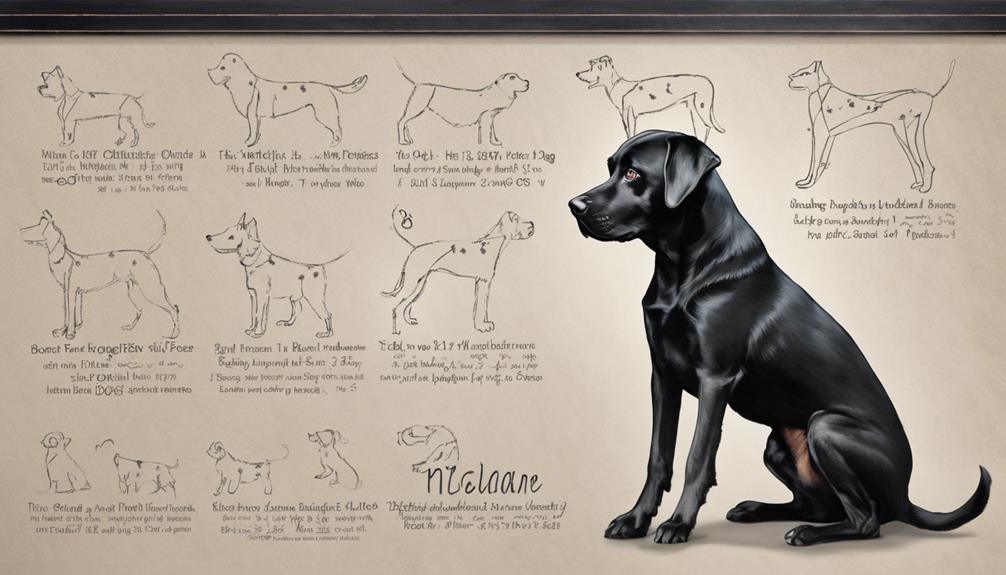
When selecting a unique black dog name, consider rare options that aren't commonly heard. Creative names for black dogs can capture their individuality and make them truly special.
Uncommon black dog names can set your furry friend apart and make them stand out in any crowd.
Rare Black Dog Names
How can we discover the perfect rare black dog name that embodies our furry friend's uniqueness and charm? When choosing a rare black dog name, consider exploring unconventional places for inspiration. Here are some tips to help you find that ideal name:
- Investigate mythology and folklore for intriguing name ideas.
- Dive into literature, movies, or TV shows for distinctive name options.
- Consider names from different languages for a touch of exotic flair.
- Reflect on your dog's personality traits to find a name that suits them perfectly.
- Draw from your own hobbies or interests to come up with a unique name that resonates with you.
With these strategies, you can find a rare black dog name that truly sets your furry friend apart.
Creative Options for Black Dogs
Exploring creative options for black dogs involves uncovering unique names that highlight their individuality and create lasting impressions. When selecting a name for your black furry friend, think about what makes them special. Consider their personality traits, physical features, or even your favorite hobbies.
Unique black dog names like Shadow, Midnight, or Onyx can add a touch of mystery and elegance. Other creative options such as Luna, Ace, or Coco can reflect a playful or energetic side. Choosing a distinctive name for your black dog not only sets them apart but also strengthens the bond between you.
Uncommon Black Dog Names
Uncommon black dog names can add a touch of personality and charm to your furry companion. Consider these unique options for your black pup:
- Midnight Shadow
- Raven
- Onyx
- Eclipse
- Noir
Choosing an unusual name for your black dog can help them stand out and showcase their individuality. These uncommon names can reflect your dog's traits or your personal interests, sparking conversations and making your pet memorable to others.
Opting for a unique black dog name is a fun way to express your creativity and style while setting your furry friend apart from the crowd. Make your black dog truly special with one of these distinctive monikers.
Elegant Black Dog Names
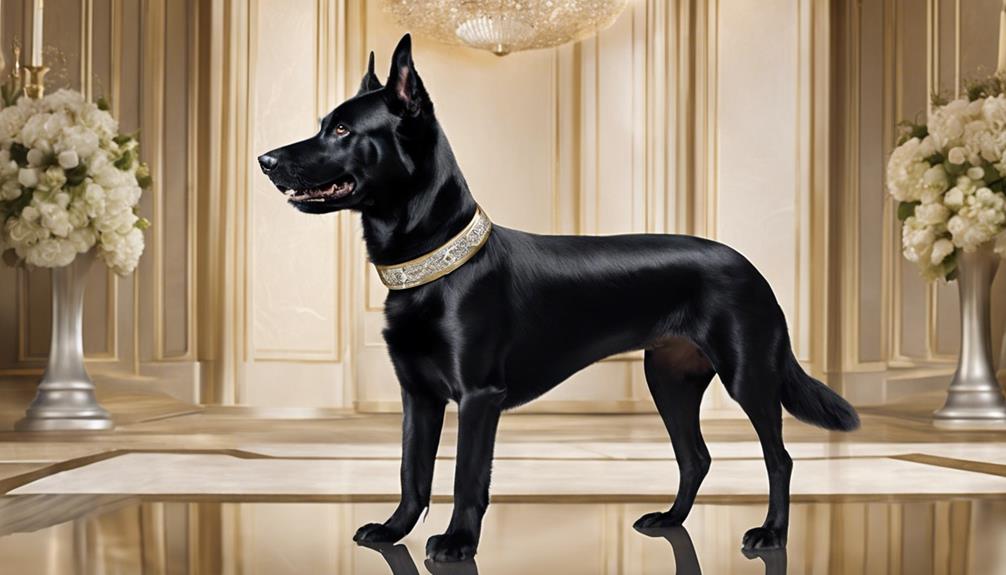
When selecting names for elegant black dogs, consider choosing sophisticated monikers that embody a sense of refinement and grace. Elegant black dog names like Duchess, Duke, Velvet, or Aristocrat can add a touch of sophistication to your furry friend, reflecting a regal demeanor. These names often have a classy feel, inspired by luxury items, historical figures, or elegant concepts, making them perfect for dogs with a distinguished presence. Imagine your black dog strutting proudly with a name that exudes elegance and style.
For breeds like Great Danes, Dobermans, or Standard Poodles, these names evoke a sense of grace and complement their majestic appearance. By opting for an elegant name, you can set your black dog apart from the rest and highlight their refined personality. Whether you're drawn to names that sound majestic or those that convey a sense of luxury, choosing an elegant black dog name is a delightful way to celebrate your furry companion's charm and sophistication.
Funny Black Dog Names
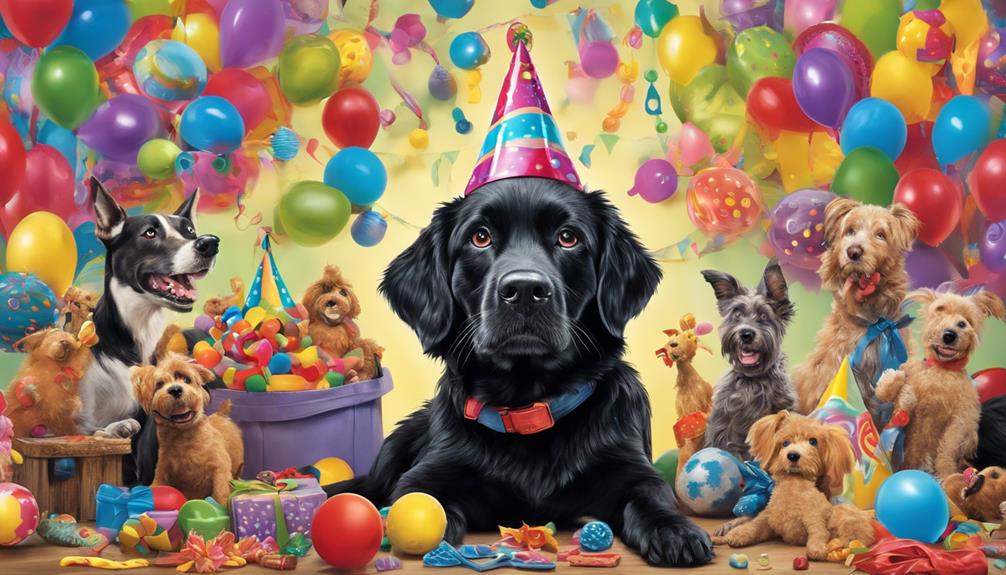
Let's explore some amusing options for naming your black dog. Funny black dog names can bring a playful and light-hearted vibe to your furry friend's identity. Here are five playful suggestions to ponder:
- Chaplin: This name pays homage to the famous comedian Charlie Chaplin, perfect for a dog with a knack for making you laugh.
- Chess: A witty name for a dog that's always one step ahead, strategizing their next move in the game of fetch.
- Liquorice: Just like the sweet treat, this name is a fun and quirky choice for a black dog with a unique personality.
- Cosmos: If your dog seems to have a universe of energy and curiosity, this cosmic name might just fit perfectly.
- Jet: A sleek and speedy name for a black dog that zooms around like a jet plane, bringing excitement wherever they go.
These names aren't only funny but also creative, adding a touch of fun to your dog's everyday adventures.
Stylish Black Dog Names

Sophistication and elegance shine through in stylish black dog names like Onyx, Tux, and Guinness, reflecting a sense of class and charm perfectly suited for a fashionable pup. When choosing a name for your black furry friend, consider names that exude sophistication and style. To help you make a choice that matches your pup's unique personality, we've curated a list of stylish black dog names in the table below:
| Stylish Black Dog Names | Description |
|---|---|
| Onyx | Represents elegance |
| Tux | Classic and refined |
| Guinness | Sophisticated choice |
| Raven | Mysterious allure |
| Midnight | Conjures elegance |
These names not only sound chic but also add a touch of class to your dog's identity. Whether you prefer a name that hints at mystery like Raven or one that embodies sophistication like Onyx, these stylish black dog names are sure to make a lasting impression. Choose a name that resonates with your pup's persona and showcases their unique charm.
Sweet Black Dog Names
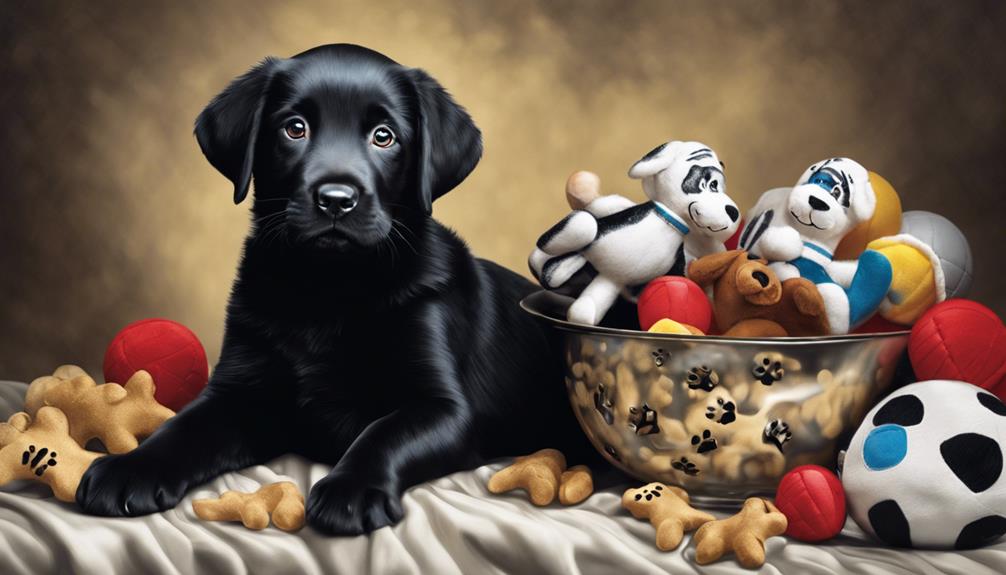
When contemplating sweet black dog names, it's essential to ponder both classic and unique options. Classic names like Shadow or Midnight can bring a timeless charm to your furry friend, while unique names such as Onyx or Luna can add a touch of individuality.
These names not only sound endearing but can also strengthen the bond between you and your pet.
Classic Black Dog Names
Classic black dog names, such as Onyx, Midnight, and Tux, exude a timeless charm and appeal that perfectly suits a variety of black dog breeds. When choosing a classic black dog name, consider the sweet and endearing quality that these names often possess. Here are some examples of classic black dog names that you may find fitting for your furry companion:
- Shadow
- Coco
- Bear
- Luna
- Pepper
These names aren't only easy to pronounce but also carry a sophisticated and elegant appeal, making them ideal choices for your beloved black dog.
Unique Black Dog Names
Let's explore a delightful selection of unique black dog names that capture the sweet essence of your new furry friend.
When choosing dog names, opting for something unique can set your pet apart and reflect their individuality. Sweet black dog names emphasize your pup's endearing qualities, fostering a special bond between you.
These names can vary from cute and playful to elegant and sophisticated, aligning with your dog's personality. Not only do unique black dog names showcase your pet's charm, but they also serve as conversation starters and help make your furry friend memorable to others.
Bold Black Dog Names
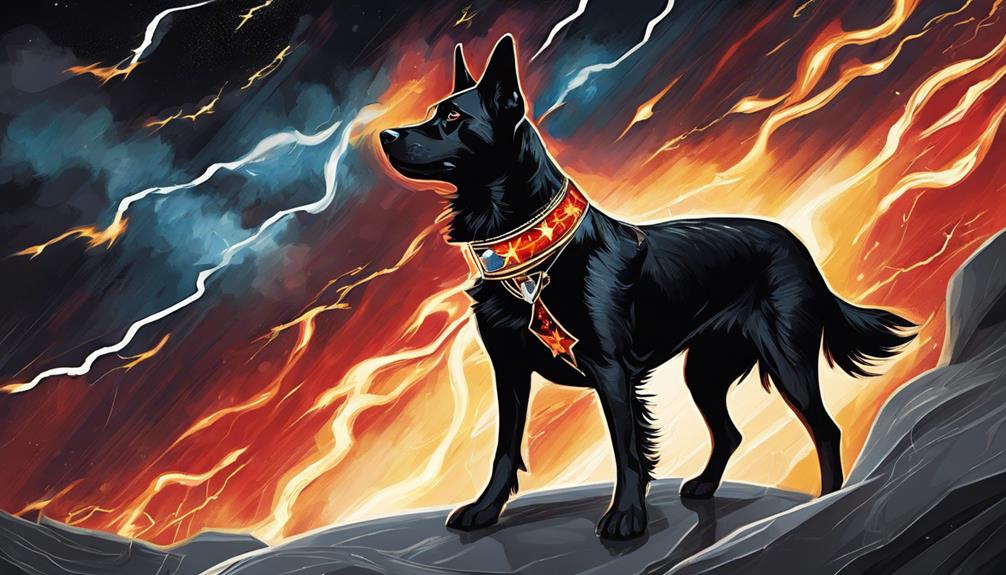
For bold black dogs, choosing a name with a powerful or mysterious connotation can enhance their presence and make a statement. When selecting a bold name for your black furry friend, consider options that exude strength and uniqueness. Here are five bold black dog names to help your canine companion stand out:
- Shadowcaster: This name evokes a sense of mystery and intrigue, perfect for a dark and enigmatic dog.
- Midnight: Symbolizing the darkest hour, this name is ideal for a black dog with a sleek and striking appearance.
- Eclipse: Inspired by the celestial event, this name signifies a rare and powerful presence.
- Raven: A symbol of intelligence and adaptability, this name suits a bold black dog with a keen mind.
- Onyx: Reflecting the deep black gemstone, this name exudes elegance and sophistication, perfect for a stylish canine companion.
Choosing a bold name for your black dog can't only reflect their unique personality but also emphasize their charm and individuality.
Pop Culture Black Dog Names
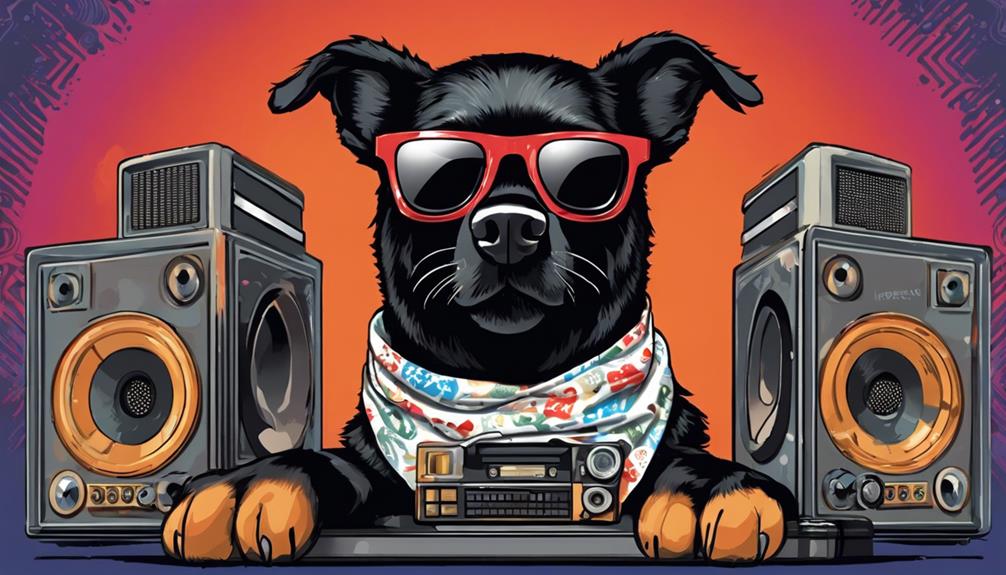
Inspired by beloved characters from movies, TV shows, and books, pop culture black dog names offer a fun and familiar way to add personality to your furry friend. Names like Batman, Sirius Black, and Shadow are popular choices for black dogs.
Imagine calling out 'Batman, come here!' to your playful pup – it adds a cool and heroic vibe to your daily interactions. Sirius Black, from the Harry Potter series, brings a touch of mystery and loyalty to your dog's persona. Shadow, a classic black dog name inspired by the loyal companion in 'Homeward Bound,' reflects the deep bond between you and your four-legged friend.
These pop culture black dog names aren't just random choices; they carry meaning and connection to iconic characters that many people love. Choosing one of these names can spark conversations with fellow fans and create a special bond between you and your furry companion.
Timeless Black Dog Names
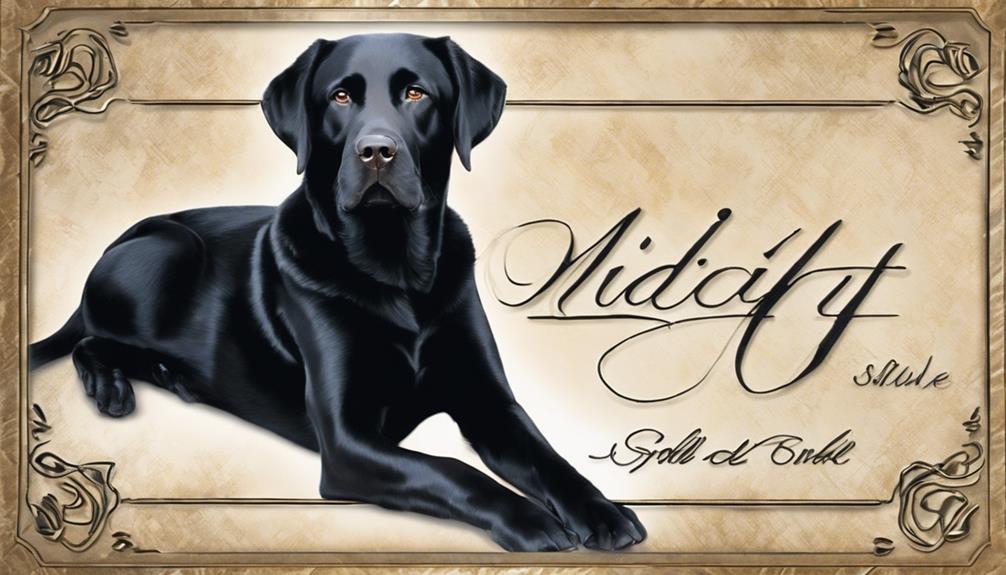
Timelessly cherished for their enduring appeal, black dog names hold a special charm and elegance that transcends generations. When selecting a timeless black dog name, consider options that have cultural significance or draw inspiration from elements like nature, mythology, or literature. These names have stood the test of time and are widely recognized for their classic appeal. Choosing a timeless black dog name for your furry friend can imbue them with a sense of tradition and sophistication.
- Onyx: A sleek and elegant name inspired by the black gemstone.
- Midnight: Reflecting the deep darkness of night, this name exudes mystery.
- Tux: Short for tuxedo, this name brings to mind formal attire and style.
- Raven: Symbolic of intelligence and mystique, perfect for a black pup.
- Guinness: A nod to the famous dark beer, giving a touch of uniqueness to your dog's name.
Frequently Asked Questions
What Is a Good Black Dog Name?
When selecting a name for your black dog, consider their personality, size, and appearance. Opt for unique names like Onyx, Midnight, or Tux, which can add a special touch to their identity. Raven, Guinness, or Morticia are great choices too.
For a playful twist, funny names like Chaplin, Liquorice, or Jet can be entertaining. Make sure the name is easy to say, reflects your dog's character, and is suitable for all stages of their life.
What Is a Fluffy Dog Name?
Fluffy dog names capture the essence of a pup's soft and cuddly appearance. These names can evoke warmth and charm, reflecting the dog's fluffy nature.
From whimsical to sophisticated, they offer a range of options for naming your furry friend. Inspired by fluffy objects, animals, or beloved characters, a fluffy dog name adds personality and coziness to your pet.
Choose a name that highlights your dog's lovable and fluffy qualities!
What Is the Name of the Black Fluffy Dog?
When naming a black fluffy dog, consider factors like appearance, personality, and special traits.
Popular black fluffy dog names include Shadow, Bear, Midnight, Luna, and Coco.
Owners often choose names reflecting the dog's playful nature, like Whiskers, Paws, or Snickers.
The chosen name should resonate with the dog, making them feel loved and special.
Ultimately, pick a name that suits your furry friend's unique qualities and brings joy to both of you.
What Is the Name of a Furry Dog?
When selecting a furry dog, consider breeds like the Pomeranian, Shih Tzu, or Maltese. These dogs typically have long, fluffy coats that require regular grooming. Keep in mind, owning a furry dog means dedicating time to grooming and maintenance.
Make sure you're prepared to commit to brushing, bathing, and caring for your furry friend's coat to keep it healthy and tangle-free. Choose a furry dog breed that fits your lifestyle and grooming capabilities.
Conclusion
To sum up, selecting the ideal name for your black furry companion is a significant choice that mirrors their personality and distinctiveness.
Did you realize that black dogs are frequently disregarded in shelters, with some research indicating they're less inclined to be adopted?
By bestowing upon your black dog a name that matches them flawlessly, you aren't just paying tribute to their uniqueness but also aiding in dispelling stereotypes and providing them with the affection and attention they merit.
